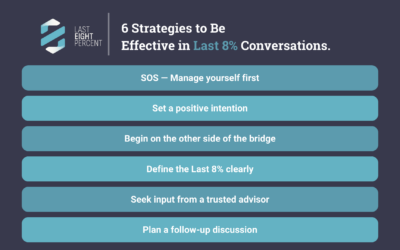Recent articles
Six Strategies to be Effective in Last 8% Conversations
One of the biggest challenges faced by everyone across all organizational levels, including CEOs I work with, is mastering the art of…
8 Ways to Become a Last 8% Culture
Your competitive advantage over competitors is not your strategy or product. Your biggest opportunity to have a sustained point of difference is your culture.
The Pitfalls of a Transactional Culture: Why Your Organization Needs a Shift
Many companies unknowingly default to this culture, which promises short-term gains but…
A Silent Crisis: Is Fear Silently Hurting Your Organization?
When considering the types of organizational cultures, one of the most prevalent is what we call the “fear-based”
The Dangerous Lie of ‘Nice’ Organizations: Why Your Family Culture is Doomed to Fail.
Being overly nice can be a silent killer of growth, progress and innovation. When teams prioritize…
4 Reasons to Invest in Developing Your Leaders
4 Reasons to Invest in Developing Your Leaders. Developing leaders is an investment in the future of any organization. Strong leaders are critical to…
5 Ways to Win with Culture
Organizational Culture refers to the set of values, beliefs, and practices that shape the behaviour of individuals and groups within an organization. A strong Organizational Culture can…
Resilience: The Number 1 Skill You Need to Overcome Adversity
What exactly is resilience? And why is it so important when we face change, adversity or any kind of challenging situation?
3 Skills You Need To Manage Change Successfully
“It’s not the strongest species that survives, not the most intelligent. It is the one that is the most adaptable to change.”









